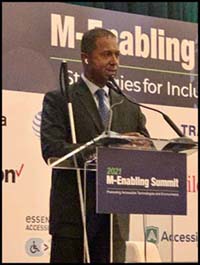U.S. Access Board Staff Present at Conferences, Forums, and Meetings during National Disability Employment Awareness Month (NDEAM)
During National Disability Employment Awareness Month (NDEAM), U.S. Access Board staff presented at conferences, forums, and events to advance accessibility and inclusion for people with disabilities. Board staff presented on various topics, such as the President’s Executive Orders, emerging technology and trends, information and communication technology resources, and the guidelines and standards under the Americans with Disabilities Act (ADA), the Architectural Barriers Act of 1973 (ABA), and Section 508 of the Rehabilitation Act.

On October 4, Sachin Pavithran, Executive Director of the Board, delivered a keynote at the M-Enabling Summit 2021 on perspectives on digital inclusion as related to President’s Biden Executive Order on Diversity, Equity, Inclusion, and Accessibility (DEIA) in the Federal Workforce. The Executive Order requires the Board to coordinate with other agencies to support the federal government’s effort to ensure that agencies comply with applicable laws related to disability, including Section 508, which requires access to information and communication technology developed, procured, maintained, or used by federal agencies, and the ABA, which requires access to facilities designed, built, altered, or leased with federal funds. Pavithran discussed the value of thinking about accessibility as a unique skill set and a different way of approaching workplaces, particularly within an organization. He noted that "cultural shifts take time. The conversation of accessibility needs to be part of the organization’s culture."

Several Board staff presented at the 2021 Interagency Accessibility Forum (IAAF), which includes Board staff on the planning committee, on October 12-14. Kathy Eng, Senior ICT Accessibility Specialist, discussed the ICT Accessibility Testing Baseline Portfolio and reviewed updates on progress and ongoing efforts related to the portfolio. Eng noted the benefits of federal agencies adopting and implementing a Baseline-aligned test process and provided suggestions to agencies for preparing to evaluate their existing test processes to validate alignment with the ICT Testing Baseline. More information and an example from the Forms Baseline can be found in the Board’s August 4 news release.

Board Executive Director Pavithran also presented in the IAAF session on digital accessibility, answering questions about its broader role as part of the government-wide diversity, equity, inclusion, and accessibility efforts. Tim Creagan, Senior Accessibility Specialist, was also a panelist at IAAF for the keynote address "Accessibility: A Look at the Foundation (Past, Present, and Future)." Creagan discussed accessibility as one of the foundations of diversity, equity, and inclusion, including its past, present, and future.
Creagan also presented at the Federal Reserve Board’s NDEAM panel that raised awareness of disability issues in the federal workplace on October 20. Creagan talked about the role of the Board in developing ABA Guidelines and Section 508 Standards to ensure and improve access in the federal workplace. At the USDA Section 508 Awareness Event on October 21, Creagan was a panelist for "The Value of a Section 508 Program," where he responded to attendees’ questions about Section 508 implementation, testing, and standards.

On October 25, Bruce Bailey, IT Specialist, presented to MITRE as part of their National Disability Employment Awareness Month (NDEAM) and ten-day long Accessibility Technical Exchange Meeting (TEM). Bailey gave an overview of the history and current work of the Board and outlined the interplay between W3C WCAG 1.0, the Original 508 Standards, WCAG 2.0, and the Revised 508 Standards, showing how the Standards extended WCAG requirements to be applicable to documents and software in addition to web content.

On October 27, Randall Duchesneau, Accessibility Specialist, and Juliet Shoultz, Transportation Systems Engineer, presented at a virtual discussion hosted by Partners for Automated Vehicle Education (PAVE) on accessible infrastructure and autonomous vehicles (AV). Duchesneau briefly reviewed guidelines for transportation vehicles and what would be the necessary technical requirements to make AVs accessible, particularly regarding ramp slopes and boarding platforms. In discussing some of his personal experiences, Duchesneau also underscored the value of universal design and holistic thinking of AVs within a larger system.

Shoultz elaborated on this value by emphasizing that AV designers need to consider how AVs would operate in the existing infrastructure and what barriers currently exist. Similarly, transportation designers, Shoultz also noted, must think about the current infrastructure and barriers in place if AVs are to operate within the system. In moving forward, Duchesneau and Shoultz suggested that AV and transportation designers consult and request input from those who will face those barriers as a way to determine how to maximize the accessibility of AVs and the infrastructure. A recording of the panel discussion is available on PAVE’s YouTube Channel.
Duchesneau and Shoultz’s discussion continues the Board’s work on AVs, which includes its four-part series of virtual meetings on making autonomous vehicles (AV) accessible to passengers with disabilities that was held in Spring 2021. All four sessions in the series are archived and available to the public on the Board’s AV webpage. The Board also produced a publicly available Summary Report on the series.
The Board regularly provides virtual trainings on its guidelines and standards upon request. In the month of October, Board staff provided trainings to the New England ADA Center, the Boston Society of Architects, the American Shore and Beach Preservation Association, the Department of Justice, and the Massachusetts Department of Transportation, among others. To inquire whether a training on a specific accessibility topic would be useful to you, email training@access-board.gov.
The Board provides technical guidance on its accessibility guidelines and standards and accessible design through its toll-free helpline (1-800-872-2253) and by email (ta@access-board.gov). Accessibility specialists are available to answer questions on accessibility as it relates to the built environment, outdoor sites, streets and sidewalks, transportation vehicles and vessels, information and communication technology, and medical diagnostic equipment.

